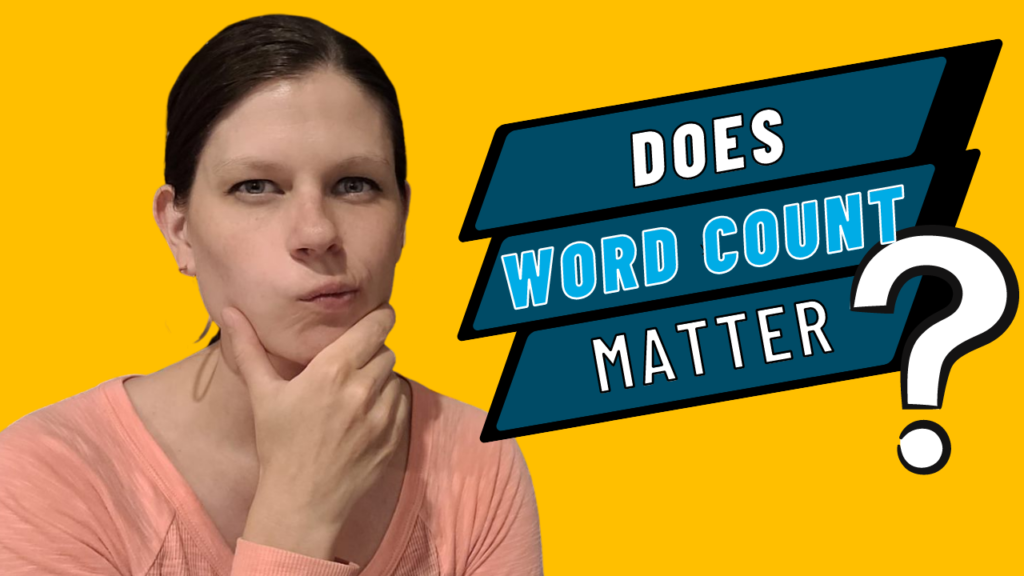
Why Word Count Doesn’t Matter
I see it all the time: writers asking, “How many words do I need for my story?” or “Is there a certain word count or chapter count I need to aim for?” or some variety.
In the industry, there are certain ‘standards’ about classifications for books whether it be a short story, novella, or novel, it’s crammed into a word count range and writers often worry that unless they match up to these standards, that they won’t be well-received, or that they’ll somehow fail.
However, all of this is totally bogus!
What ends up happening is that in the focus on the numbers, writers end up getting stumped trying to stretch their content to meet a quota or they end up trying to cut out tons of content that may actually be necessary in order to prayerfully get accepted.
Word counts, page counts, even chapter counts…
Do not matter!
What matters is the content itself. Readers don’t care about numbers. They care about content. Can they engage in your writing? Can they emotionally connect? Does it create an escape for them? Is there mind tingling with inspiration or breakthroughs as they identify with the lessons you’re sharing?
Whether you’re writing fiction or non-fiction… whether it’s a memoir, a romance, a fantasy, a health book, or anything else… what the reader gains from your story is what matters.
If the book feels stretched out, your readers will feel it. If it feels crunched and like important pieces are missing, readers will feel it. It will take them out of the book instead of keeping them sucked in page after page.
Now, if focusing on numbers goals works for you, then do it. I always believe that when it comes to writing, you have to know your own style, what works for you, and then do it.
My point is that when you only stay focused on numbers, a book’s content often doesn’t develop the way that is adequate for that story.
Instead, at least for the first draft until it’s 100% written, the focus should be on simply expressing the content itself as much or little as feels needed. When you reach the end of a scene, a segment, a topic, or the book itself, you feel it.
The doubts, fears, worries, etc. are just that. They’re negative self-talk but it doesn’t mean that the content isn’t what it needs to be. So be gracious with yourself and your craft and keep going.
Focus on sharing or writing what needs to be on the page. If it’s too much, it’s okay. If it feels like it’s short, it’s okay. Remember that the beauty of writing a book is that it’s actually not set in stone. You can always make revisions, have new editions, tweak, shift, etc.
And most importantly, that’s why when you’re writing the first draft it’s called the first draft. It’s not intended to just come out beautifully perfect from the get-go. There are supposed to be second, third… however many drafts are necessary to polish it into the amazing book readers get to read.
So again, instead of focusing on standards, what others think, or number goals (outside of using them for a helpful guideline, of course), just write. Share the content that adequately expresses the story and then go one step at a time from there.
Relevant Links
Book Your Complimentary Bestseller Assessment
Free Publishing Checklist
Follow on Facebook
Follow on Instagram
Follow on LinkedIn
Subscribe to the Podcast

Katelyn Silva
4x Bestselling Author
Your Book Can Change a Life
Katelyn Silva is the author of eleven books, some under a pen name, with four #1 bestsellers. She has been both self and traditionally published and is the founder of We Write Books. She has helped hundreds, and specializes in guiding Christian mompreneurs to get clarity on their book idea, confidently write and publish a bestseller, and use it as a business tool to create impact, authority, and legacy. Katelyn is also a devoted wife and homeschooling mom. Explore more about Katelyn, check out any of her books or her clients’ books, view testimonials, and get free resources at wewritebooks.com.
